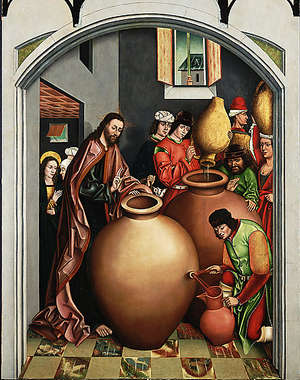
CORPUS CHRISTI, TX (Catholic Online) – The miracle of Jesus at the wedding at Cana in the Gospel of John (John 2:1-11) is one sign or (in Greek) semeion of a number of signs or semeia (plural for semeion) contained in the first part of this Gospel. These signs are intended to witness to who Christ was. It is a short enough story to warrant including it in whole:
"On the third day there was a wedding in Cana in Galilee, and the mother of Jesus was there. Jesus and his disciples were also invited to the wedding. When the wine ran short, the mother of Jesus said to him, ‘They have no wine.’ Jesus said to her, ‘Woman, how does your concern affect me? My hour has not yet come.’ His mother said to the servers, ‘Do whatever he tells you.’ Now there were six stone water jars there for Jewish ceremonial washings, each holding twenty to thirty gallons. Jesus told them, ‘Fill the jars with water.’ So they filled them to the brim."
"Then he told them, ‘Draw some out now and take it to the headwaiter.’ So they took it. And when the headwaiter tasted the water that had become wine, without knowing where it came from (although the servers who had drawn the water knew), the headwaiter called the bridegroom and said to him, ‘Everyone serves good wine first, and then when people have drunk freely, an inferior one; but you have kept the good wine until now.’ Jesus did this as the beginning of his signs (semeia) in Cana in Galilee and so revealed his glory, and his disciples began to believe in him."
Although most of St. John’s signs or semeia are intended to point to Christ, this sign also seems to suggest something of what happens to a man or woman who becomes incorporated into Christ, becomes one with Christ, who can say, with St. Paul, "to me, to live is Christ." (Phil 1:21). In short, it allows us to understand what happens to the human nature of a Christian when he lives in a state of sanctifying grace, is ushered into the supernatural life, and is thereby transformed by the Holy Spirit to a new creature in Christ. (2 Cor. 5:17)
Theologians have long disputed about how to best explain the relationship between nature and supernature, between nature and grace. Catholics maintain that, despite man’s fall, nature is, to a great degree, good and really worthy of saving. If our human nature were evil, it would not warrant being redeemed and saved.





